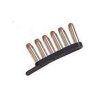Just as having a handgun is no guarantee that you'll be able to accurately hit your target, having spare ammunition is no guarantee that you'll be able to effectively either load it, or use it. Proper training & frequent safe practice can help with reloading skills, just as with shooting skills.
I also agree that as with most of the actual, hands-on training and practice involving defensive handguns, the laws governing the lawful use of deadly force, and the carrying of concealed handguns, are of primary interest and concern. Kind of like worrying about high-speed driving before someone has even taken the time to learn the rules of the road, qualified for a DL and obtained vehicle insurance ...
Same thing for realizing that avoidance is often a highly underrated awareness skill.
First things first.
Sadly enough, though, I've seen far too many folks ... both L/E and CCW ... that had a hard enough time loading their weapons on the range when not under any stress other than preparing to engage in some course of fire. There are folks that find reloading a pistol within 5 seconds to be a highly stressful, difficult task ... and that's without the paper targets shooting back, obviously.
As far as non-L/E folks not ever needing to reload a defensive weapon in an actual deadly force situation? Well, if I'm remembering correctly, I think I remember a home-invasion type situation several years ago where a victim's revolver ran empty, and he was killed. I can think of another situation several years ago where an off-duty cop was the victim of an attempted armed robbery, and he ended up firing something like 8 rounds from his .45 pistol, at close range, making several hits, before the threat was stopped.
You just never know ...
Magazines can certainly be involved in some malfunctions. I take a lot of care in maintaining mine ... keeping my carry magazines clean & dry, and inspecting the condition of the bodies, followers, butt plates, inserts/catches, and springs ... as well as each round of carry ammunition that I load in them.
While I decided a long time ago that it's easier to replace magazine springs on some periodic usage/time basis
before I experience any problems resulting from a weakened/worn spring, I've had a couple of worn follower (plastic) issues develop which caused malfunctions on the range, and which immediately caught my attention. Now
everything gets examined fairly frequently. Naturally, different types of magazines can have some different needs due to construction, design, materials ,etc., etc. I pay attention, though ...

I generally carry one or two 12-round spare magazines on duty in my plainclothes assignment. My soon-to be new .45 ACP service pistol is going to be issued with 5 magazines, however, since they're 8-round magazines, and we decided that it's simply easier to issue them and have our folks carry them for uniform duty, than for them to feel 'under-equipped'. I'll still only carry 1-2 spare magazines in my plainclothes assignment (and off duty), but I'll have 5 with me for uniform situations in the future.
When I carry my 642-1 J-frame, while there have been a couple of instances where I've only carried a single speed strip, I usually carry two of them as my preferred minimum ... and more often either 5 speedloaders or a couple of speedloaders and a couple of speed strips, depending on my dress and planned activities. 5-shot speedloaders take up so little space in lightweight jacket pockets, and speed strips easily slip into a rear or front pants pocket and carry lightly, without adding much visible 'bulk' to a pocket.
I didn't mean for this to turn into a 'personal preference' response, but as you can probably tell from my response ... and as a L/E firearms trainer & CCW instructor ... you can see that I've thought about the necessity of being able to properly, efficiently & quickly reload in a defensive situation.
It doesn't have to be fancy or esoteric ... it just has to work when needed ... and be useful under the various circumstances that I can envision and anticipate.
I may not ever
really need these skills ... and that's fine. Doesn't mean I practice them any less. Same thing with my martial arts interest. I don't consider it to have been a waste of my time for 34 years.

I'd avoid some of the unnecessarily complicated and convoluted reloading practices that break reloading down into multiple 15-step procedures that require you know how to dance the Watusi and look uber-tactical at the same time, though.

Simplicity and practicality aren't necessarily bad attributes when things get fast & fuzzy in the real world. That's also the worst time to discover that Mr Murphy has become bored, and wants to
What-If? us ...


